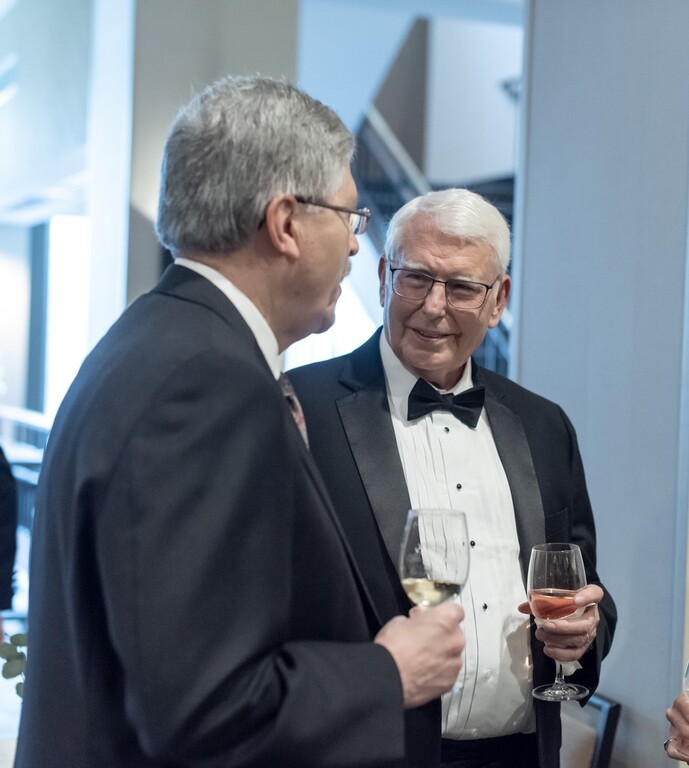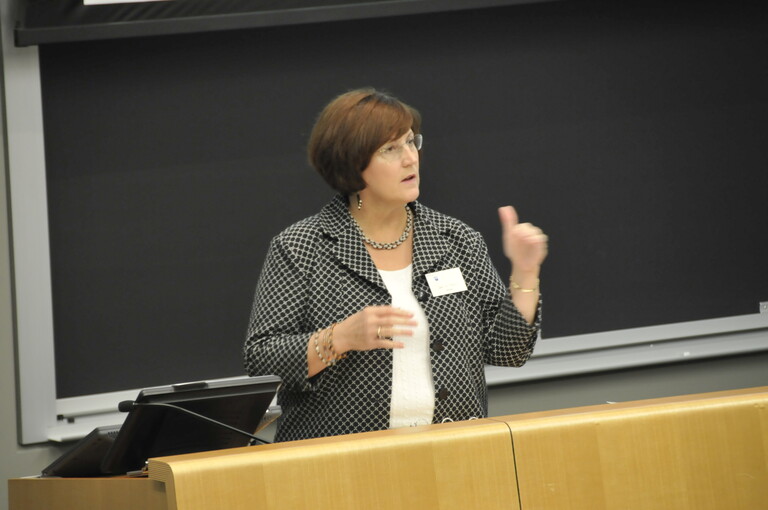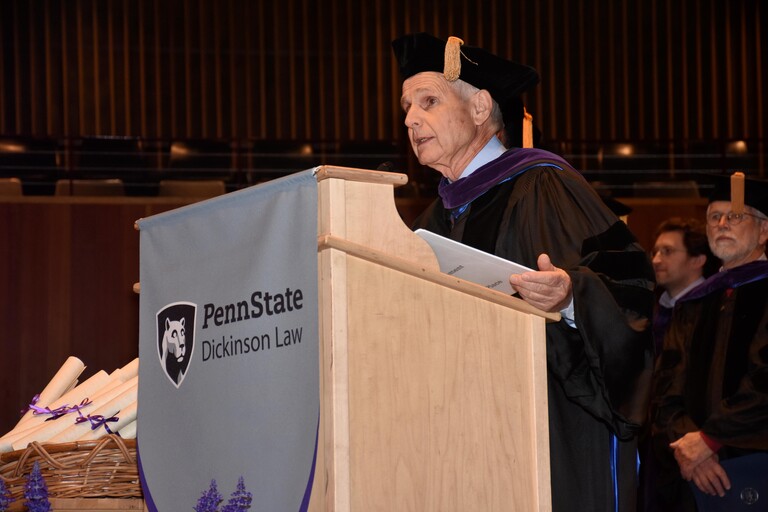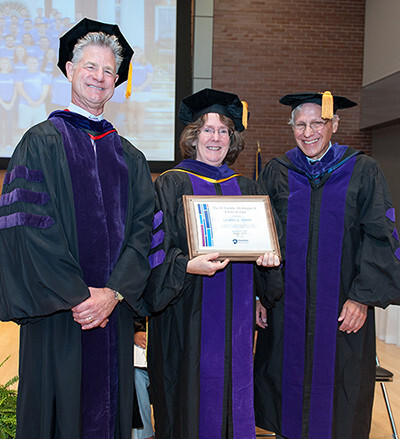CARLISLE, Pa. — Dean Emeritus Peter G. Glenn, Associate Dean Emerita for Library and Information Services Gail A. Partin, 1993, Professor of Law Emeritus Thomas Place, and H. Laddie Montague Chair in Law and Professor of Law Emerita Laurel Terry shared many unforgettable years together as longtime members of the Penn State Dickinson Law faculty. From their teaching and research excellence to their mentorship of students and collective leadership, the impactful contributions they have made to the Dickinson Law community, the legal academy and beyond during their nearly combined 97 years of service have been remarkable. Before joining the esteemed ranks of the emeriti faculty, each reflected on their journey to and time spent at Dickinson Law, and shared what lies ahead.
Tell us about your path to Dickinson Law.
Glenn: “In 1992, two law school deans and the American Bar Association consultant on legal education suggested to me that I seek to become a law school dean. I was nominated and applied for several deanships in the eastern United States, became a finalist for a couple of positions, and was invited to Carlisle to meet members of the faculty and the board of trustees. I was impressed with the commitment of Dickinson Law to the practice of law and was lucky enough to be invited to become the ninth dean of the law school.”
Partin: “While working at Penn State College of Medicine’s Harrell Health Sciences Library, a colleague convinced me to join her in a new program offered by Clarion University to pursue a master’s in library science. Upon earning my degree in spring 1985, there were no open librarian positions at the Harrell Health Sciences Library, but there was a reference librarian position open at the law school. I interviewed for the position, received an offer, and began work on July 1, 1985.
Place: “I joined the law school faculty in 1974 after serving for five years as a public interest lawyer in eastern Kentucky, where I co-founded Mountain Legal Rights —the first legal service program in that region of the country to provide free legal assistance to needy clients in a wide range of civil matters. I also spent a few years in private practice focusing on environmental matters and criminal law.”
Terry: “I came to Carlisle in 1985 from Portland, Oregon. I had moved to Portland after law school for a judicial clerkship and stayed to practice with a large firm. Moving to a new part of the country had been a very positive experience, so I was willing to relocate once I decided that I wanted to become an academic. I got a big map of the United States and put colored dots on the schools I interviewed with at the Association of American Law Schools’ recruitment conference. I had immediately liked the Dickinson Law group during the screening interview, and my callback experience made me feel like my colleagues, the students and Carlisle would be a great fit. My intuition turned out to be right.
How did your roles evolve at Dickinson Law over the years?
Glenn: “I served as dean from July 1, 1994, to June 30, 2002. My role evolved from administrator to law professor for two years (2005-06) following service as executive deputy counsel and acting general counsel with the Governor’s Office of General Counsel. I returned to the faculty as adjunct professor of law for five years (2015-20) following a career chapter as general counsel and shareholder at Stevens and Lee in Harrisburg, Pennsylvania.”
Partin: “I provided research and reference assistance to faculty, law students, and the public while earning my JD at Dickinson Law. By 1999, I was teaching a credit course in legal research to first-year law students. In 2005, I was named interim law library director and went on to serve in associate director and director roles before being promoted to associate dean for library and information services, H. Laddie Montague Jr. Law Library at Dickinson Law.”
Place: “I have served as a professor of law for almost 47 years. During my tenure, I founded the law school’s in-house legal clinic program in 1979 and taught a variety of required and elective courses. I also served as chair of the faculty and chair of the Promotion and Tenure, Admissions, Academic Rules, Honor Code, Faculty Rights and Responsibilities, Faculty Development, and Curriculum committees.”
Terry: “One great thing about being a professor is that even though the role itself may not change, what you do in that role can change and evolve. I’ve taught professional responsibility and civil procedure since my first and third years here, but I am constantly tweaking my teaching and the content. It is also possible to branch out in an entirely new direction. I recently spent a lot of energy creating the required first-year law student course that is currently called ‘Law Practice II: Contexts & Competencies,’ and I’m proud of the way that course helps our students.”
What have you enjoyed most about your time at Dickinson Law?
Glenn: “I have greatly enjoyed teaching our students, but my greatest enjoyment has been working together with all members of the Dickinson Law community, students, faculty, staff and alumni.”
Partin: “Over the years, I have enjoyed building relationships with and getting to know the students and colleagues I met as they passed through the halls of the law school, whether fleetingly in three years or for decades as colleagues. Students bring a freshness and earnestness with them (and certainly youthfulness, now that I am getting older!) that energizes and amazes me and revitalizes my perspective on the future. On the other hand, building lasting friendships with faculty and staff colleagues over the years has been a true gift to be treasured.”
Place: “I have particularly enjoyed working with our in-house legal clinic students one-on-one, accompanying them during their first court appearance and working with students involved in independent study projects.”
Terry: “That’s a hard question to answer. Gail, Tom, and Peter have captured so much about what is wonderful in this job. I would just add that when I work one-on-one with a student and see a light bulb go off, or when I get an email from a student or an alum saying that something I did had an impact, that makes my day (and sometimes my week)!”
What professional accomplishment are you most proud of?
Glenn: “The challenge of the deanship and the special challenge of the Penn State merger.”
Partin: “After decades of working in groups and on committees to identify and articulate the skills necessary to be a competent legal researcher, a task force that I chaired finalized the “Principles and Standards for Legal Research Competency,” which were adopted and approved by the executive board of the American Association of Law Libraries in 2013. It was widely adopted by law librarians, lawyers, scholars and professors as the gold standard to assess the research competence of newly minted lawyers and is still the preeminent legal research competency assessment tool to this day.”
Terry: “I’m proud of the work I’ve done to facilitate global networks and relationships. With respect to concrete projects, I am proud that my work on proactive regulation and regulatory objectives has had a real-world impact. I hope it has helped make things better for clients and easier for lawyers.”
What scholarly activities do you plan to continue during retirement?
Glenn: “I plan to complete a law review article arguing that the supervisory relationship in law practice is the result of the fulfillment of obligations by supervising lawyers and the persons being supervised, and the managers of the law firm. I also want to continue my research about the best practices involved in facilitating the job mobility of experienced attorneys and to decide whether there is a worthwhile article to be written about lateral lawyer hiring. I also intend to reorganize 300 pages of course materials I wrote for the fall 2020 semester seminar in law practice management and prepare what might become a coursebook useful in law schools. These research and writing projects will enable me to blend my deep interest in legal education with my law practice experience and my interest in the relationships that make organized law practice enjoyable in ways that are fulfilling for lawyers.”
Place: “During retirement, I plan to update my treatise, ‘Post Conviction Relief Act – Practice and Procedure’—now in its 13th edition—which is used by trial judges, law clerks, prosecutors, and defense counsel, and is in the library of every state and county prison in Pennsylvania. I also hope to complete a history of habeas corpus in Pennsylvania.
Terry: “I hope to continue working on many of the same issues that I’ve been working on before retirement, such as extra-legal competencies, cross-border legal practice, how money-laundering rules should apply to lawyers, and various international trade in legal services issues. But there are a lot of new (to me) issues that committees I serve on are looking at, such as whether and how to regulate artificial intelligence’s use in the delivery of legal services and the role of climate change in international trade in legal services.”
What do the first few years of retirement look like to you?
Glenn: “I will spend my winters in Florida, spend more time exercising and golfing, and spend more time with my adult children and stepchildren.”
Partin: “Over the years, I have spent a lot of time thinking about stories of my childhood and hope to write a series of illustrated children’s books. I also want to visit every national park in the United States. I have traveled to most of the 50 states (except Alaska and Hawaii, which I hope to do sometime soon) and always make a point of visiting national parks.”
Place: “In the short term, most of my time is spent building a new home on land my wife and I have owned for a few years just outside Carlisle.”
Terry: “The first thing I plan to do is some major pruning and organization at both home and work; I’m hoping this doesn’t take years! I don’t have a clear vision yet of exactly how retirement will unfold, but I know that I would like to spend a significant amount of time dealing with family photos and memorabilia I have inherited. I feel like I am a custodian for future generations, and I don’t want the valuable items I have to get lost in a sea of papers. I am also looking forward to exercising more regularly.”
What will you miss the most about the Dickinson Law community?
Glenn: “I am very grateful for the support and friendship of many Dickinson Law people, especially members of the law school staff who make it possible for administrators, faculty, and students to accomplish their goals.”
Partin: “While I will miss my friends and colleagues, I will most miss the excitement of building a better future for Dickinson Law and seeing their collective efforts come to fruition. Helping to enhance the prestige and status of our law school and preserving its tradition of excellence has truly been an honor.”
Terry: “I will miss the opportunity to have one-on-one interactions with students and feel that I have helped them. I will also miss the challenge of classroom teaching and trying to think about how best to present an idea so that it is memorable and understandable. Since I live close to the law school, I am hoping that I won’t in fact miss my faculty and staff colleagues—I will just see them at times other than faculty meetings.”
What is something that the Dickinson Law community may not know about you?
Glenn: “I love the music of the Modern Jazz Quartet.”
Partin: “My first car was a cherry red 1966 Austin Healey Sprite convertible that my parents ‘inherited’ when my older brother joined the Marine Corps—a car so small it could probably drive underneath an 18-wheeler tractor trailer. I loved that car! I love to play cards, any kind of game—pinochle, spades, gin rummy, blackjack, and more. Most family gatherings end up with a card game going on in one of the rooms of our house.”
Place: “I enlisted in the Army when I was 17; having been raised in northern Minnesota, I enjoy wilderness canoeing and have made multiple trips in the Boundary Waters and in Quebec, Ontario, and British Columbia.”
Terry: “Because I’ve used my civil procedure exams to create a diary of my life, people know quite a bit about me. But they may not know that I’m thinking about taking singing lessons in my retirement. I am a terrible singer, but I’d like to learn to be a little less terrible because I enjoy singing with a couple of the ukulele groups I’m involved in.”




